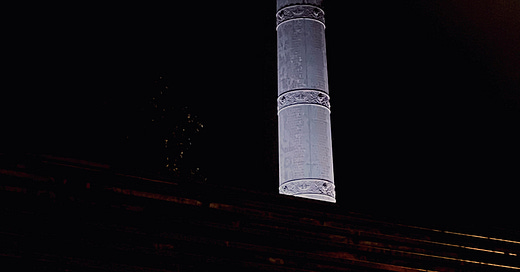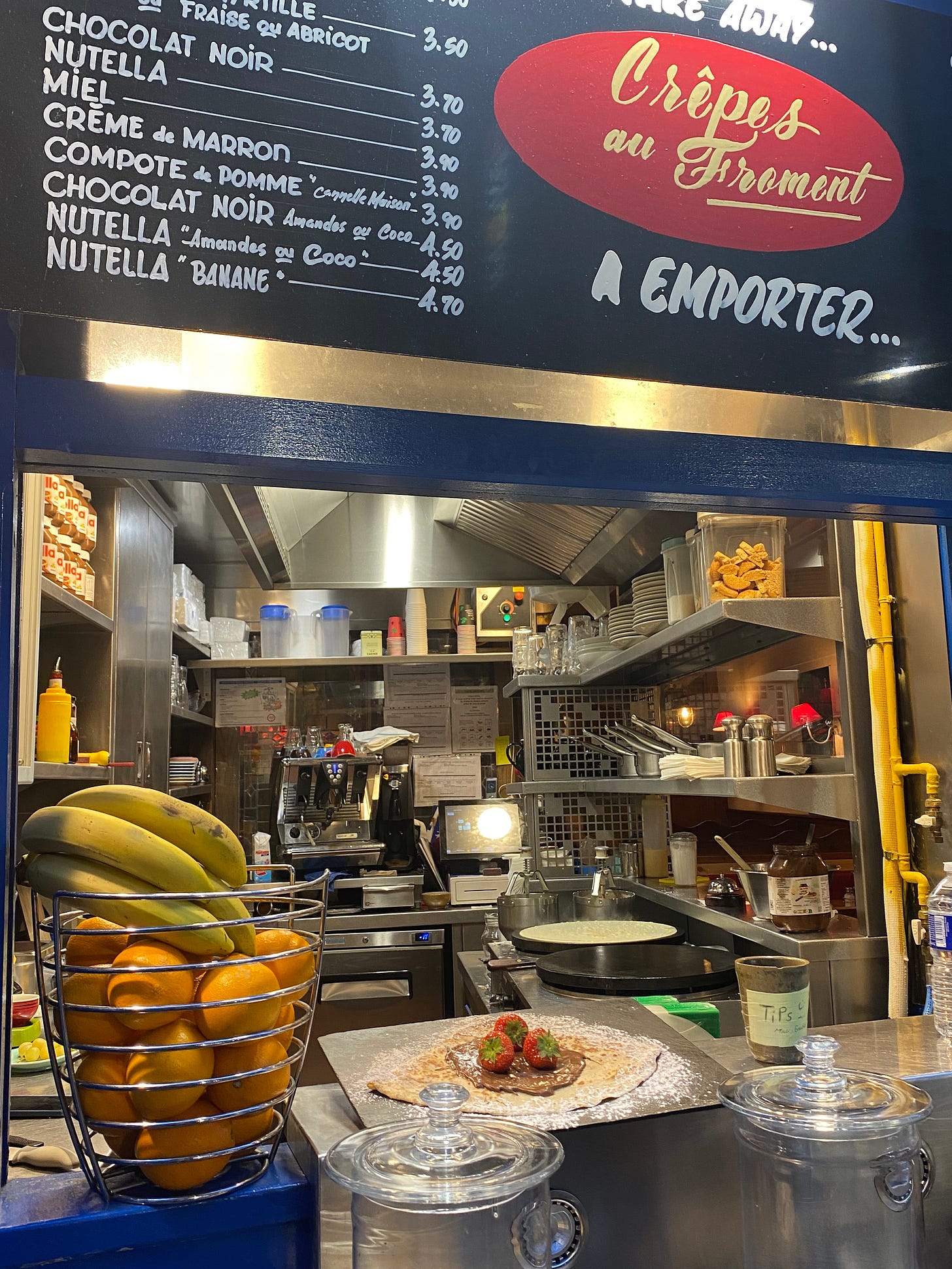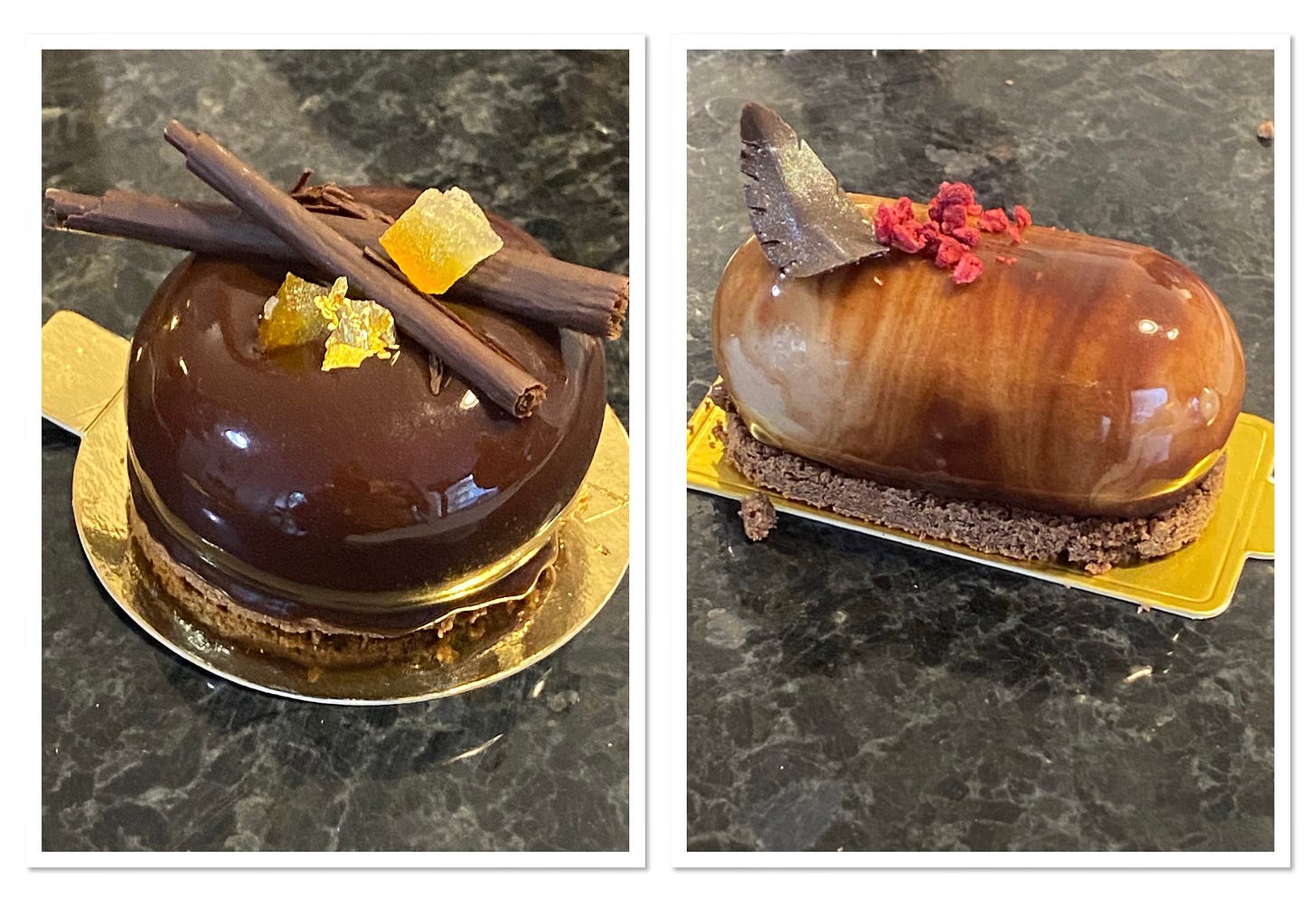I’ve been thinking a lot about freedom. This could be because I’m temporarily living in an apartment a stone’s throw from the Bastille in Paris. Last night I even imagined I could hear the ghosts of the prison-storming rabble echoing in the night. Sadly, when came time to find plates for this morning’s croissants it became prosaically apparent that the reverberating murmurings of revolutionary discontent were only the sloshings of the dishwasher on its final cycle.
The July Column, Place de la Bastille, Paris
Lack of physical freedom is of course a very real thing for others at the moment. The walls by the falafel stand in Rue de Rosiers are plastered with red-bordered posters demanding the return of hostages. My husband and I are captivated (pun intended) by the constantly updating live feeds from Al Jazeera and the BBC reporting on the plight of innocents trapped in the apocalyptic hellhole that is Gaza at present. (We are also rather impressed that you can get a mobile phone signal on the underground Metro trains to enable us to refresh the feed even as we hurtle toward the Museum of the Liberation of Paris.)
There is also the issue of the freedom of the little brown mouse which has found its way into the crannies of this old building. It bravely used its freedom to explore our living space. First, it darted between two sofas, fast enough to make me wonder if I had imagined it. Then I saw it sauntering across the kitchen. Finally, it chose to sit and blatantly regard my husband as he was performing his ablutions. Now it is being hunted down by an employee of the rental company, an obliging man who apparently speaks neither French nor English. I am rather egging the mouse on, hoping it will use the time we are engaging in rodent-themed mime to escape to the cobbled courtyard before it is caught and guillotined.
The freedom I have been pondering most, however, is the freedom that strikes creatives at the time when they escape from the restrictions of the first half of life and enter a time when they are gifted more open time to focus on their practice. Specifically, I have been considering the paradoxically paralysing nature of being able to run free. Or to put it another way, I have been trailing around the Latin Quarter with a steaming apple compote crepe in my hand wondering: if you can do anything you want, how do you know what best to do? If you are finally free from constraints, how do you manage the vast freedom to do anything you like?
This of course is not an original thought so much as a rite of passage. Emmanuel Kant contemplated this distinction between ‘negative’ and ‘positive’ freedom and Erich Fromm in the 1940s and 1950’s gave it his close attention. He pointed out that the positive freedom to do whatever you choose in fact brings with it some not-inconsiderable discomfort and anxiety because of the responsibility it involves. As a result, sometimes we give up some of our freedom to alleviate that tension.
Being fed work in a day job might be tedious but it can also bring a degree of comfort. Even a first career like mine, one that granted a degree of autonomy and decision-making power is performed in a framework that contains it, a box that provides expectations and ready-made boundaries. Making creativity a second half of life practice requires a full embracing of positive freedom, requiring not just the making of objects but the making of our own parameters, policies, and principles. Indeed, there is a positive encouragement to work outside of existing structures, to be daring, rule-breaking, and original. This is not easy, especially when the rewards are not immediately obvious. It is driving me, I don’t mind saying, to much crepe-eating while I figure out how to navigate it. ( That is my excuse anyway, it being a well-known fact that there are no calories in street food absorbed for the sole purpose of feeding your brain as it tangles with philosophy.)
Interestingly Fromm, who was thinking about these freedoms more in general societal terms, came up with three avoidance behaviours to which those struggling this way are apt to fall. I found they translated well to my creative life.
First, he says, we can escape to authoritarianism. That might mean finding an organisation or movement that will tell us what to do. I have found that this can be subtle, a one-step remove from finding a place that is appropriately supportive. If an organisation supports you to only do something one way, then not having an alternative voice in your ear can turn it into a comforting voice of authority.
The Indie publishing world, for example, draws me. I have been traditionally published multiple times and I understand the disadvantages of royalty-based contracts and the bottleneck that is the agenting world. The freedom to employ your own editors and designers and form your own publishing imprint is undeniably wonderful. However, the more time I spent delving into the material of one particular group of authors the more I felt myself being pulled off track just a smidgen. They were so enthusiastic about their ways of creating - fast, publishing of genre fiction - that I began to imagine adopting their practice. For a little while it was a relief. Here was a wheel that didn’t need reinventing. I could go along on it for a ride just following the instructions. It felt good. Except when I thought about the fact that their definition of success and motivations were very different to mine. Then it felt like I was being beckoned into a new career that looked very different to my old one but which in many ways made my heart sink in just the same way. I would have been free from the need to find my own path, but not free to write the way I wanted to.
Another form of this authoritarian escape, Fromm said, is becoming the expert yourself. Ouch! That resonated. I am used to that ground. I’ve taught and trained professionals since I was 23. The easy thing when I left law was to try to transfer that skill to a different area. Just do what you did before. How hard can that be? And yet, when I tried, - and to a degree succeeded I once again felt trapped. I was comfortably free from the rigors of having to invent a new way of being but not at all free to grow with the vulnerability and beginner’s mind necessary to get where I wanted to be.
Fromm’s second form of escape is destruction. Being afraid of what the free world might do to you, you destroy it first. For creators that might manifest in the paralysing attitudes of There is no money in writing so there is no point in spending time doing it or No-one values my art. I’m not wasting time making it only to throw pearls to pigs. Or in my case, a fear that, just as my previous career hurt me mentally with its excessive demands that led to burnout, if I throw myself wholeheartedly into something new I might once again get hurt. These destructive thoughts have the potential to thwart that burgeoning second-half of life practice before it even begins. I can be free from risk but not free to grow into my full potential.
The third defense mechanism Fromm calls ‘automaton conformity’. For creators, this might look like making only what easily sells but does not satisfy, the unevaluated adoption of marketing techniques that have proved successful (allegedly at least) for others, or the uncritical, non-discerning following of a guru-like mentor or teacher. This is tempting because, in that vast expanse of freedom, we need community. I am particularly prone to craving artistic acceptability or permission - even seeing something avant-garde in the Pompidou centre will produce in me a response along the lines of, Oh, so that’s allowed. So probably my ideas would be in the rules too.
It’s good to have encouragement and role models and it’s fine if your work is naturally positioned in the mid-stream. It’s not fine to accept the fallacy that the absence of someone else modeling what you want to do means you should not take that path. Community is vital to creative well-being, but if we allow community to become conformity we give up our freedom to be original. Which can be temptingly comforting. As Fromm said, “If I look like, talk like, think like, feel like… everyone else in my society, then I disappear into the crowd, and I don’t need to acknowledge my freedom or take responsibility.”
I can see all these dangers and accept the need to avoid slipping into the insidious pull of their gravity field. Mindfulness helps me here. The pause between reaction and action is where I can ask: am I falling into my known traps of wanting to be an expert or needing permission? Am I assuming that I have to go with the majority to succeed? Yet, if I do avoid that freedom-sucking fall, I am still left with the anxiety that stems from the vastness of the positive freedom to do whatever I wish. How should I manage that? It’s a good question and one which a crepe au caramel beurre salé will not solve. ( Though I can attest to the fact that they certainly don’t make the anxiety any worse. )
For answers, I have begun to turn to the concept popularised by Daniel Putnam, that of ‘psychological courage’. Physical courage is the usual concept of the brave individual soldier fighting against the odds to save his people. Moral courage is standing up to the social pressure to say or do certain things. For example, it may be the act of declaring against the majority view in your social grouping that your brave soldier has killed too many civilians and that the lives of all people are of equal value.
Psychological courage is more internal. It is about grasping the mettle when it comes to admitting that we need to change, grow, and take on risk and responsibility. It can be about facing not mortal enemies or social approbation but our own deep-seated fears of failure, mediocrity, or pointlessness. It is the courage necessary to be ourselves, stable in the face of social pressures. Core to psychological courage is the capacity to accept that life is not a double-blind trial, and that we will never truly know if we did the ‘right’ or best’ thing. All we can do is choose a path and deal not only with the consequence of our choice but with the absence of the results of the choices we did not make.
My reading tells me that whereas psychologists have traditionally believed that courage - of the physical or moral variety - has required fear to trigger it, psychological courage can be activated by a softer, more niggling quiet sense of discomfort or concern. A slight wandering toward the edge of the road, if you like. The beginnings of divergence from the life we want to lead.
Certainly, periods of observation have helped me to see in my own life that just a slight leaning towards a belief that I will fail if I don’t fit in with perceived wisdom, an accepted way of doing things, which is not my authentic way, will induce anxiety. Activating courage, however, will tamper down that anxiety. One might think that the opposite would be true, that taking the apparently easy route of fitting in would relieve the anxiety born of having to stand alone. And yet, if I do the activities I am drawn to, no matter how much I diverge from the so called ‘expert’ voices that leap from the Internet to lodge in my head (Yes, thank you, voice. I know that this article is probably too long, doesn’t have enough SEO links and no clickbait title. But this is how I want to write, OK?), then I enter a flow state and the anxiety dissipates.
I recognise too that this psychological courage is necessary because I am so often fighting against the ‘norms’ that I have adopted or adapted from external sources. Or held onto when they are no longer relevant. I confessed to my mother recently that I was worried that if I stopped doing some legal work I was no longer drawn to, she would think I was wasting my education. She was baffled. I had achieved far more than she ever expected me to. Why on earth would I think that? I mentioned the day when she offered to clean houses to help pay for an expensive Cambridge Masters degree before I went to law school. Her only request then was that I didn't waste it. I had been holding on to that, worried that if I now tilted headlong into a noncommercial enjoyment of creativity I would be reneging on my side of the bargain. She didn’t even remember the conversation. In fact, she pointed out that it was making the most of my education that had created the very freedom I now have. Sometimes psychological courage is about the bravery of dropping baggage over the side of the boat.
So that is where I am. Practicing not only creativity but psychological courage. No doubt it’s where I’ll be the next time I write this newsletter. And the next time and the next. Because I have this amazing chance in life to really embrace the true freedom of creating not just art and articles but a whole way of living and I don’t want to give that up for the false comfort of escaping the concommitent anxiety. I won’t even give it up for a banana chocolate crepe. Although if anyone is offering to nip over to my favorite stall on the Left Bank to get me one, I dare say it will help me get through proofreading this article very nicely, thank you.
For you to ponder:
When are you prone to surrendering your freedom to avoid anxiety?
Who can you ask to keep you accountable and to support you to grow your psychological courage?
The word courage comes from the Old French ‘courage’ meaning heart. Where in your creative life can you put a little bit more heart into your work?
(NOT) From the studio:
Studio? What studio? I’m in Paris! I did make these in my patisserie class last week though.
Shalom,
Helen





Thank you so much for writing this. It’s quite serendipitous and I love that feeling.
It resonated very much for me in many ways. Only yesterday did I realise that I was somehow seeking ‘permission’ to leave a job that has felt like it was killing me slowly. I had the realisation that I don’t need permission and I can leave and walk through the door of a creative, more compassionate and motivated life - but like you mentioned in your post, one that has no immediate guarantees of being paid. But I feel free and alive and want to do good things, so I will just follow that feeling.
I am 54 and the age thing has been holding me back too but as my 70 yr old friend told me yesterday as she went off to play drums in her rock band, I am just a baby. Which immediately makes age seem at once unimportant but also open to being perceived in whatever way we like.
Thank you for your words of support for creativity in the second half of life!
This was such a powerful article Helen, thank you. I have spent a life time lacking understanding of my neurodiversity, (by myself and by others who mattered). I know that is common amongst women of a certain age (such things were not discussed, referred to), my eureka moment came at 60, when I recognised who I was, and allowed myself to embrace this rather shy but much more authentic person. I also learned to say no to things that I should or ought to do, and yes to things that I want to do for me, whatever the reasons. And allowing myself to express my creativity has been one of the blessings of this new journey I find myself on. It’s ok, and I’m ok, most of the time. I was moved almost to tears by the response of your wonderful mother, I lost mine this year and found myself! It would have been lovely to have understood each other better, I was always loved, but little understood especially when I veered off the ‘normal’ norms occasionally, although masking covered over many of the trip hazards externally (just not internally). A powerful piece that I will carry with me throughout the day.